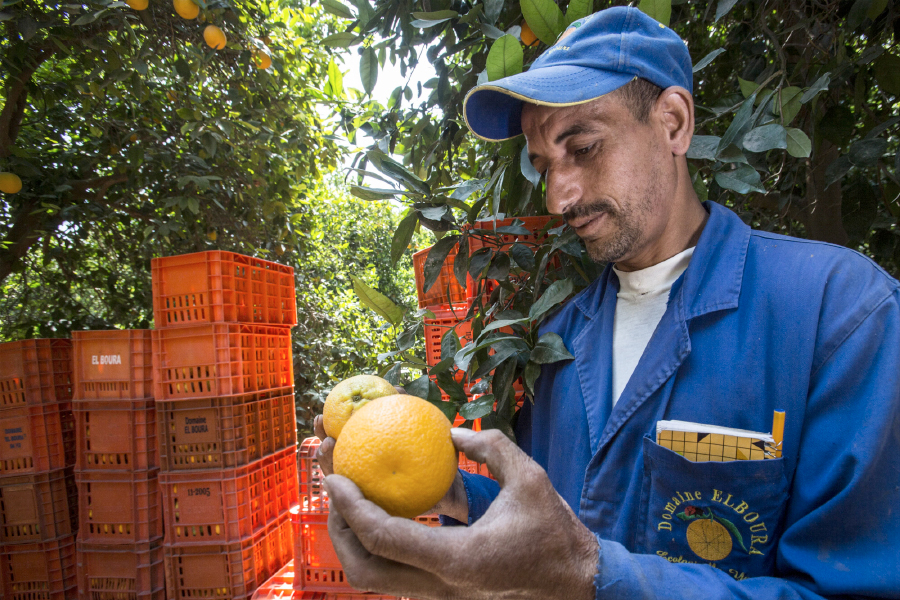Sustainability drives trends in trade for Moroccan fresh produce

Fruit and vegetable production and exports are an important sector for Morocco. The Food and Agriculture Organization of the United Nations (FAO) and the European Bank for Reconstruction and Development (EBRD), with the support of the European Union (EU), are working with Morocco’s Ministry of Agriculture, Fisheries, Rural Development, Water and Forests (MAPMDREF) and Morocco FoodEx – the Ministry’s export control and promotion arm – to promote environmental, social and economic sustainability in Morocco’s horticultural sector.
On 16 July 2021, the working group hosted a webinar where panellists from Germany and Italy contributed to a discussion around burgeoning opportunities for fresh produce, through enhancing environmental sustainability standards.
The event took the temperature of sustainability trends to support producers, exporters and retailers to match increasing market demand for fresh and sustainable Moroccan products.
El Mehdi El Alami, who is Director for promotion and development at Morocco FoodEx, said, “We are seeking further export opportunities for Moroccan fresh produce that meet the highest environmental and social standards expected in the EU.”
“To achieve this, we are working with farmers, exporters, retailers, regulators, consumer groups, EBRD and FAO, amongst many others, to ensure our fresh produce is competitive, efficient and sustainable,” he added.
Jean-Christophe Filori, Head of Cooperation of the European Delegation to Morocco, echoed that sentiment.
“The Farm to Fork Strategy is at the heart of the European Green Deal, aiming to make food systems fair, healthy and environmentally friendly,” he said. “Moroccan agro-industry can realize its potential provided that it continues to comply with international quality standards, in particular those of European markets. The EU is pleased to support such a practical seminar for exporters.”
Strong consumer demand
Morocco is establishing itself as one of the top suppliers of fruits and vegetables to European markets. The country is already a major exporter of citrus, avocado, vegetables and berries to key markets and is increasingly targeting new markets such as Poland. The Moroccan climate is favourable for a year-round supply of fresh produce, leading to a flourishing market for Moroccan horticulture.
Claudio Mazzini, Fresh Sales Manager, Coop Italia, said, “There is increasing potential for Morocco to supply good quality and more sustainable fresh products. Strong consumer demand in Europe for more traceable and environmentally friendly produce is a powerful force in shaping more sustainable food supply systems.”
In Germany, this trend toward conscious consumption has an influence on the market, said Patrick Freund, from the World Wildlife Fund Germany.
“The demand for fresh fruits and vegetables is increasing in Germany, and there’s a willingness to pay for products that are not only healthy but have less of an impact on the environment. There are more and more people who want to know that the citrus fruit they are buying, for example, was grown more sustainably and has at least put less strain on limited water resources,” he said.
Green Generation
Morocco’s fruit and vegetable sector, though still climate vulnerable, can play an important part in helping Morocco achieve its sustainability goals.
FAO and the EBRD interventions are providing support to Morocco’s ‘Green Generation 2020-2030 plan’, characterized as a ‘new vision’ for the country’s agriculture sector, promoting sustainability, agricultural productivity, climate resilience and the economic inclusion of youth in rural areas.
The strategy encourages the adoption of new technologies that can improve the efficiency of agricultural production and water use.
“Green Generation 2020-2030 is set to revitalise the sector with a clear focus on sustainability – economically, socially and environmentally,” said Redouane Arrach, Director of Strategy and Statistics, MAPMDREF. “It is vital that the policy framework works in alignment with the strong market demand for more sustainable products.”
At the request of Morocco FoodEx, FAO and the EBRD are supporting the development of a certification to communicate key sustainability aspects on Moroccan fresh produce. Morocco FoodEx has requested FAO and EBRD assistance in identifying options to develop a logistics platform in Poland for Moroccan fruits and vegetables to supply new markets.
Othman Tlemcani, Principal Banker at EBRD, said, “There is significant investment and value addition potential in increasing the sustainability aspects of Moroccan fresh products, and we are pleased to support this exciting direction for the Moroccan horticultural sector.”
